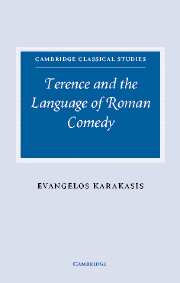Book contents
- Frontmatter
- Contents
- Acknowledgements
- Conspectus siglorum
- Introduction
- Part I Linguistic differentiation in Terence
- 1 Colloquialisms
- 2 Archaisms
- 3 Senilis μακρολογία and περισσολογία
- 4 Hellenisms
- 5 Features of elevated language
- 6 Idiolect
- 7 Plautus in Terence: the case of Eunuchus
- Part II Linguistic and stylistic unity in Roman comedy
- Bibliography
- Index locorum
- Index nominum et rerum
4 - Hellenisms
Published online by Cambridge University Press: 22 September 2009
- Frontmatter
- Contents
- Acknowledgements
- Conspectus siglorum
- Introduction
- Part I Linguistic differentiation in Terence
- 1 Colloquialisms
- 2 Archaisms
- 3 Senilis μακρολογία and περισσολογία
- 4 Hellenisms
- 5 Features of elevated language
- 6 Idiolect
- 7 Plautus in Terence: the case of Eunuchus
- Part II Linguistic and stylistic unity in Roman comedy
- Bibliography
- Index locorum
- Index nominum et rerum
Summary
It has long been recognised that lower-class characters in the plays of both Plautus and Terence use words of Greek origin in greater numbers than do upper-class characters.
Tuchaendler was the first to examine the distribution of Greek loan words in both Plautus and Terence, concluding that ‘maximam insignium tralatorum partem in ore hominum inferioris ordinis maximum servorum esse’. Hough (1947: 18–21), examining the question anew, arrived at the same conclusion. Furthermore, he claimed that the tendency of both dramatists to put Greek words into the mouths of lower-class characters increased as their careers progressed. Gilleland (1979: 84 ff.) argued for a common pattern in Roman comedy, underlying the striking similarities between the figures for Greek words in Plautus and Terence. Both dramatists agree in giving more words than average to the servus, parasitus, miles and leno, and fewer than average to the senex, adulescens, matrona, meretrix.
More recently, the subject has been reexamined by Maltby (1985), who again reaches the same conclusion. Maltby, however, unlike all his predecessors, makes a distinction between Greek words that would have had a real Greek flavour in Terence's time and those which had been borrowed early into Latin, or at least had become well integrated in the language by Terence's time, and would no longer have retained their foreign colouring for the author.
- Type
- Chapter
- Information
- Terence and the Language of Roman Comedy , pp. 83 - 89Publisher: Cambridge University PressPrint publication year: 2005

